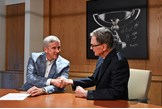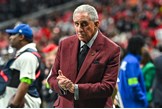What the PGA Tour's $3bn deal with Strategic Sports Group means for golf
Published: Last updated:
The PGA Tour have a new partner, Jay Monahan has a new job, and nearly 200 players stand to receive over $1.5 billion in immediate and future equity.
But what exactly does this $3 billion deal with Strategic Sports Group (SSG) mean for the framework agreement with the Saudi Public Investment Fund (PIF)? And why are Liverpool Football Club’s owners investing in golf?
Allow us to answer all your burning questions, starting with the obvious…
What new deal?
The PGA Tour have agreed to a $3 billion investment from Strategic Sports Group, a consortium led by Fenway Sports Group (FSG) who own Liverpool Football Club and the Boston Red Sox.
The partnership, which has been rumored since December, will give nearly 200 players access to more than $1.5 billion as equity owners in a new for-profit venture called PGA Tour Enterprises.
Wait, what happened to the PGA Tour’s agreement with the Saudi Public Investment Fund?
The PGA Tour only agreed to try and make a deal work with the PIF. The framework agreement on June 6 brought an end to all litigation between both parties, but negotiations have dragged on due to pushback from players and anti-trust concerns which are still being investigated by the US Department of Justice.

The original deadline of December 31 was extended into 2024 with the hope of finalizing the terms before the Masters.
However, the PGA Tour have been actively exploring other avenues amid interest from private equity groups. They officially entered into talks with SSG on December 10 which is what led to this announcement.
So does this mean the merger isn’t going ahead?
Not quite. The PGA Tour have confirmed that both parties are still “working towards an ultimate agreement”.
A memo sent to members also revealed that this agreement with SSG does allow for co-investment from the PIF in the future, subject to regulatory approval.
Who are the PGA Tour’s new partners?
SSG is made up of a consortium of American sports team owners, led by FSG who own the Boston Red Sox and Liverpool Football Club.
The frontman is FSG Principal John Henry but other high-profile members include Arthur Blank (owner of the Atlanta Falcons, pictured below), Steven Cohen (New York Mets), Andrew Cohen (Atlanta Falcons and Atlanta United), Wyc Grousbeck (Boston Celtics), Marc Lasry (Milwaukee Bucks), Tom Ricketts (Chicago Cubs) and Mark Attanasio (Principal of Milwaukee Brewers and Norwich City).

Combined, the investment group boasts more than 200 years of experience in sports and entertainment. Three of the investors also own TGL teams.
“We greatly appreciate the opportunity to join PGA Tour players in this important next phase of the PGA Tour’s evolution,” says Henry, Manager of SSG.
“Our enthusiasm for this new venture stems from a very deep respect for this remarkable game and a firm belief in the expansive growth potential of the PGA Tour.
“We are proud to partner with this historic institution and are eager to work with the PGA Tour and its many members to grow and strengthen the game of golf globally.”
OK, so what is PGA Tour Enterprises?
PGA Tour Enterprises is a new for-profit division, tasked with maximizing commercial opportunities through sponsorships, licensing and media rights deals.
Basically, it’s a way of bringing in outside investment without affecting the PGA Tour’s 501(c)(6) tax-exempt status.
So how will the partnership work exactly?
SSG will serve as a minority investor in the new Enterprise, with the Tour retaining a controlling interest. SSG plan to invest up to $3 billion into PGA Tour Enterprises with an initial input of $1.5 billion.
The Golf Channel are reporting that Monahan has told players part of SSG’s investment will be used to fuel growth in areas such as the Tour’s digital platforms, data programs, DP World Tour, and the Tour’s international presence.

How will the players benefit?
An initial $930 million in equity will be distributed to members – past and present – according to four distinct categories. Over 80% – or rather $750 million – of the grants will be shared among 36 ‘category one’ golfers with the biggest names and reputations on the PGA Tour, such as Tiger Woods and Rory McIlroy.
This will be based on career achievements, last five-year performance, and the results of the Player Impact Program (PIP).
Category two is then reserved for 64 players and $75 million of equity, which will granted according to performances over the last three years. Another $30 million will be shared among 57 players who meet certain exempt categories.
The remaining portion, worth $75 million, is for 36 legends who were “instrumental in building the modern PGA Tour based on career performance”.
Members can, however, only qualify for one grant, which will be paid out before the end of March.
What about the other $600 million?
Good maths. This will be made available via recurring grants, starting in 2025 and continuing through to at least the 2030 season.
That means $100 million will be doled out each year to the Tour’s top performers based on performances over the last three years, the last year, and the PIP results, which are published annually.
Why have the PGA Tour gone looking for outside investment?
The simple answer is because they need it. The emergence of LIV has cost them a lot in legal fees, assets, and comparable prize funds.
The PGA Tour promised to reward players who stayed loyal to the Tour and this equity program is just another way to do so alongside the $20 million signature events.
The money and connections also give the PGA Tour an opportunity to unlock new business – and therefore sponsorship – opportunities to replace those which they are now set to lose, like Wells Fargo next year and Farmers Insurance in 2026.
How will this impact the PGA Tour’s structure?
The PGA Tour was, by definition, a player-run tour owned by its members. This partnership has ceded some of this control to SSG in exchange for security and stability in the short-to-medium term.
There are still a lot of questions with very few answers about the terms of the investment, but the PGA Tour are a lot more powerful with a bunch of well-connected billionaires on their side.

Who is running PGA Tour Enterprises?
Monahan has appointed himself Chief Executive despite facing calls to leave the PGA Tour altogether.
He chairs a 13-person policy board, featuring six current Player Directors from the PGA Tour’s policy board: Patrick Cantlay, Peter Malnati, Adam Scott, Webb Simpson, Jordan Spieth and Tiger Woods.
Former player Joe Ogilvie has been appointed ‘Director Liason’, with Joe Gorder – who serves as an Independent Director on the PGA Tour policy board – rounding out the Tour’s representation.
SSG also have a voice with John Henry, Arthur Blank, Andrew Cohen and Sam Kennedy, a partner/CEO at Fenway Sports Group, acting as ‘Directors’ on the board.
In the original framework agreement, PIF governor Yasir Al-Rumayyan was listed as Chairman but his replacement will be elected at an upcoming meeting, according to the PGA Tour.
Where does the DP World Tour fit into this agreement?
They don’t – or at least that’s how it appears. The PGA Tour insists its strategic alliance with the DP World Tour “remains a focus”, though this new equity program is only set to benefit players on the US circuit.
The terms of the agreement have already provoked a furious response from disgruntled DP World Tour members on X, formerly known as Twitter.
Did the PGA Tour’s members know about this agreement with SSG?
Unlike in June when they were blindsided by Monahan making a deal with the Saudis behind their backs, players were given a heads-up this time.
The agreement was unanimously approved by the PGA Tour board, which includes six Player Directors — Tiger Woods, Patrick Cantlay, Adam Scott, Jordan Spieth, Webb Simpson, and Peter Malnati.
What have the players said?
In a joint statement, the Player Directors said: “It was incredibly important for us to create opportunities for the players of today and in the future to be more invested in their organization, both financially and strategically.
“This not only further strengthens the tour from a business perspective, but it also encourages the players to be fully invested in continuing to deliver — and further enhance — the best in golf to our fans.”

Jordan Spieth was asked about the new partnership – and the possible ramifications for the framework agreement with the Saudis – ahead of the AT&T Pebble Beach Pro-Am.
“I don’t think that it’s needed,” he said, referring to a potential deal with PIF.
“The positive would be a unification [of PGA Tour and LIV golfers], but I just think it’s something that is almost not even worth talking about right this second.
“The idea is that we have a strategic partner that allows the PGA Tour to go forward the way that it’s operating right now without the option of other investors.”

How does this affect LIV Golf?
It doesn’t. Chief Executive Greg Norman issued a memo to staff following the deal, saying that “nothing announced changes LIV Golf’s positive trajectory or future plans”.
Al-Rumayyan also weighed in and pledged his commitment to “investing in and supporting LIV and the team golf format” regardless of whether a deal is reached or not with the PGA Tour.
About the author

Michael Catling – Features Editor
Michael Catling is an award-winning journalist who specializes in golf’s Majors and Tours, including DP World, PGA, LPGA, and LIV.
Michael joined Today’s Golfer in 2016 and has traveled the world to attend the game’s biggest events and secure exclusive interviews with the game’s biggest names, including Jack Nicklaus, Jordan Spieth, Tom Watson, Greg Norman, Gary Player, Martin Slumbers and Justin Thomas.



